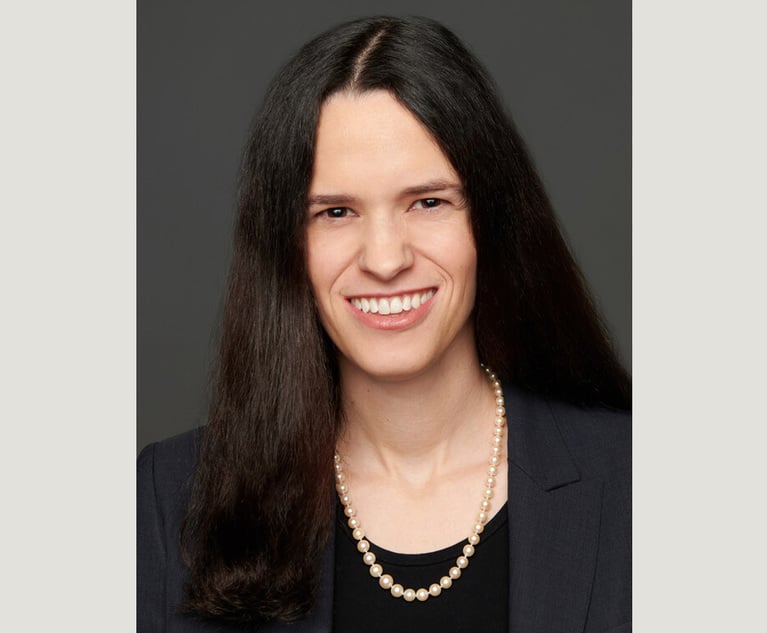It's time to raise the bar on diversity issues
General counsel must give men and women equal potential for career development.
October 03, 2011 at 08:00 PM
7 minute read
In the legal profession overall, true gender diversity appears to be moving on the fast track. Slightly more than three out of 10 attorneys are women, and almost half of law students today are women. In time, our country's attorneys will collectively reflect the gender demographics of the U.S. population. In the corporate setting, a somewhat different picture emerges.
Less than one in five major corporations has selected a woman as general counsel. Even fewer opportunities for top legal positions are provided to women at smaller corporations.
The industry in which a corporation transacts business or the nature of a company's ownership may explain why fewer women hold top legal positions.
A number of industries have traditionally been male-dominated, both at the highest levels as well as among the rank and file. For a variety of reasons, the alcoholic beverage field in which I have practiced for the past 30 years has been one such industry. But over time, women have joined the industry in key positions, including the legal department.
U.S. subsidiaries of foreign corporations may face similar limitations. Women may not have the same prospects as men in the corporate setting in the country in which the parent's headquarters are located. While female attorneys may be employed in the legal department of the foreign headquarters, they may not be able to progress beyond a certain point in the organization. That attitude of male domination tends to bleed into the subsidiary's corporate structure.
So, to the extent that these external forces are at play in a corporation, they need to be recognized and not be permitted to operate as boundaries or excuses for lack of improvement. General counsel must make a commitment to cultivat ewomen within the legal department and provide them with the same potential for career development as their male counterparts.That undertaking must be clearly articulated to the legal team and the business team that it represents.
This will require buy-in at the highest level—the executive team of the corporation. The general counsel should be an advocate of the benefits of diversity and feel comfortable being the vanguard of those dedicated to gender diversity.
This commitment extends beyond the general counsel. All male and female in-house attorneys should assume responsibility to raise the bar on diversity issues.
The general counsel must be prepared to handle doubts about the capability of the female attorneys on staff. Those doubts are sometimes a subliminal way of a businessman expressing his preference to work with a male attorney. Ask yourself: If the same legal advice were given by a male member of the legal department, would it be second-guessed or questioned? If the answer is no, then coaching and intervention will be necessary on both sides. It is best to be candid with everyone as to why there is some resistance from some business team members when it comes to accepting advice from female attorneys.
In working with outside counsel, the solo general counsel should seek out firms in which female attorneys will be given the occasion to interact with the businesspeople. This will season the business team to become more receptive to accepting legal advice from a female attorney.
The ultimate goal should be that the person selecting the general counsel or the attorneys who occupy in-house positions is gender-blind. The best candidate—irrespective of his or her sex—should be able to assume the top positions in any legal department. However, until this utopia of gender blindness arrives, the ranks of the legal department must be seeded with the right attorneys—male and female—who can function as leaders in diversity and role models to their business partners.
In the legal profession overall, true gender diversity appears to be moving on the fast track. Slightly more than three out of 10 attorneys are women, and almost half of law students today are women. In time, our country's attorneys will collectively reflect the gender demographics of the U.S. population. In the corporate setting, a somewhat different picture emerges.
Less than one in five major corporations has selected a woman as general counsel. Even fewer opportunities for top legal positions are provided to women at smaller corporations.
The industry in which a corporation transacts business or the nature of a company's ownership may explain why fewer women hold top legal positions.
A number of industries have traditionally been male-dominated, both at the highest levels as well as among the rank and file. For a variety of reasons, the alcoholic beverage field in which I have practiced for the past 30 years has been one such industry. But over time, women have joined the industry in key positions, including the legal department.
U.S. subsidiaries of foreign corporations may face similar limitations. Women may not have the same prospects as men in the corporate setting in the country in which the parent's headquarters are located. While female attorneys may be employed in the legal department of the foreign headquarters, they may not be able to progress beyond a certain point in the organization. That attitude of male domination tends to bleed into the subsidiary's corporate structure.
So, to the extent that these external forces are at play in a corporation, they need to be recognized and not be permitted to operate as boundaries or excuses for lack of improvement. General counsel must make a commitment to cultivat ewomen within the legal department and provide them with the same potential for career development as their male counterparts.That undertaking must be clearly articulated to the legal team and the business team that it represents.
This will require buy-in at the highest level—the executive team of the corporation. The general counsel should be an advocate of the benefits of diversity and feel comfortable being the vanguard of those dedicated to gender diversity.
This commitment extends beyond the general counsel. All male and female in-house attorneys should assume responsibility to raise the bar on diversity issues.
The general counsel must be prepared to handle doubts about the capability of the female attorneys on staff. Those doubts are sometimes a subliminal way of a businessman expressing his preference to work with a male attorney. Ask yourself: If the same legal advice were given by a male member of the legal department, would it be second-guessed or questioned? If the answer is no, then coaching and intervention will be necessary on both sides. It is best to be candid with everyone as to why there is some resistance from some business team members when it comes to accepting advice from female attorneys.
In working with outside counsel, the solo general counsel should seek out firms in which female attorneys will be given the occasion to interact with the businesspeople. This will season the business team to become more receptive to accepting legal advice from a female attorney.
The ultimate goal should be that the person selecting the general counsel or the attorneys who occupy in-house positions is gender-blind. The best candidate—irrespective of his or her sex—should be able to assume the top positions in any legal department. However, until this utopia of gender blindness arrives, the ranks of the legal department must be seeded with the right attorneys—male and female—who can function as leaders in diversity and role models to their business partners.
This content has been archived. It is available through our partners, LexisNexis® and Bloomberg Law.
To view this content, please continue to their sites.
Not a Lexis Subscriber?
Subscribe Now
Not a Bloomberg Law Subscriber?
Subscribe Now
NOT FOR REPRINT
© 2025 ALM Global, LLC, All Rights Reserved. Request academic re-use from www.copyright.com. All other uses, submit a request to [email protected]. For more information visit Asset & Logo Licensing.
You Might Like
View All
Advertising Tech Likely to Draw More Scrutiny in 2025 Over Consumers' Data, Lawyers Say
5 minute read

'Be Comfortable Being Uncomfortable': Pearls of Wisdom From 2024 GC Q&As

In-House Moves of the Month: Boeing Loses Another Lawyer, HubSpot Legal Chief Out After 2 Years
5 minute readTrending Stories
- 1Data Breach Lawsuit Against Byte Federal Among 1,500 Targeting Companies in 2024
- 2Counterfeiters Ride Surge in Tabletop Games’ Popularity, Challenging IP Owners to Keep Up
- 3Health Care Data Breach Class Actions Saw December Surge in NY Courts
- 4Florida Supreme Court Disbars 3, Suspends 11, Reprimands 1 in Final Disciplinary Order of 2024
- 5Chief Justice Roberts Ends Year With Defense Against 'Illegitimate' Attacks on Judiciary
Who Got The Work
Michael G. Bongiorno, Andrew Scott Dulberg and Elizabeth E. Driscoll from Wilmer Cutler Pickering Hale and Dorr have stepped in to represent Symbotic Inc., an A.I.-enabled technology platform that focuses on increasing supply chain efficiency, and other defendants in a pending shareholder derivative lawsuit. The case, filed Oct. 2 in Massachusetts District Court by the Brown Law Firm on behalf of Stephen Austen, accuses certain officers and directors of misleading investors in regard to Symbotic's potential for margin growth by failing to disclose that the company was not equipped to timely deploy its systems or manage expenses through project delays. The case, assigned to U.S. District Judge Nathaniel M. Gorton, is 1:24-cv-12522, Austen v. Cohen et al.
Who Got The Work
Edmund Polubinski and Marie Killmond of Davis Polk & Wardwell have entered appearances for data platform software development company MongoDB and other defendants in a pending shareholder derivative lawsuit. The action, filed Oct. 7 in New York Southern District Court by the Brown Law Firm, accuses the company's directors and/or officers of falsely expressing confidence in the company’s restructuring of its sales incentive plan and downplaying the severity of decreases in its upfront commitments. The case is 1:24-cv-07594, Roy v. Ittycheria et al.
Who Got The Work
Amy O. Bruchs and Kurt F. Ellison of Michael Best & Friedrich have entered appearances for Epic Systems Corp. in a pending employment discrimination lawsuit. The suit was filed Sept. 7 in Wisconsin Western District Court by Levine Eisberner LLC and Siri & Glimstad on behalf of a project manager who claims that he was wrongfully terminated after applying for a religious exemption to the defendant's COVID-19 vaccine mandate. The case, assigned to U.S. Magistrate Judge Anita Marie Boor, is 3:24-cv-00630, Secker, Nathan v. Epic Systems Corporation.
Who Got The Work
David X. Sullivan, Thomas J. Finn and Gregory A. Hall from McCarter & English have entered appearances for Sunrun Installation Services in a pending civil rights lawsuit. The complaint was filed Sept. 4 in Connecticut District Court by attorney Robert M. Berke on behalf of former employee George Edward Steins, who was arrested and charged with employing an unregistered home improvement salesperson. The complaint alleges that had Sunrun informed the Connecticut Department of Consumer Protection that the plaintiff's employment had ended in 2017 and that he no longer held Sunrun's home improvement contractor license, he would not have been hit with charges, which were dismissed in May 2024. The case, assigned to U.S. District Judge Jeffrey A. Meyer, is 3:24-cv-01423, Steins v. Sunrun, Inc. et al.
Who Got The Work
Greenberg Traurig shareholder Joshua L. Raskin has entered an appearance for boohoo.com UK Ltd. in a pending patent infringement lawsuit. The suit, filed Sept. 3 in Texas Eastern District Court by Rozier Hardt McDonough on behalf of Alto Dynamics, asserts five patents related to an online shopping platform. The case, assigned to U.S. District Judge Rodney Gilstrap, is 2:24-cv-00719, Alto Dynamics, LLC v. boohoo.com UK Limited.
Featured Firms
Law Offices of Gary Martin Hays & Associates, P.C.
(470) 294-1674
Law Offices of Mark E. Salomone
(857) 444-6468
Smith & Hassler
(713) 739-1250






